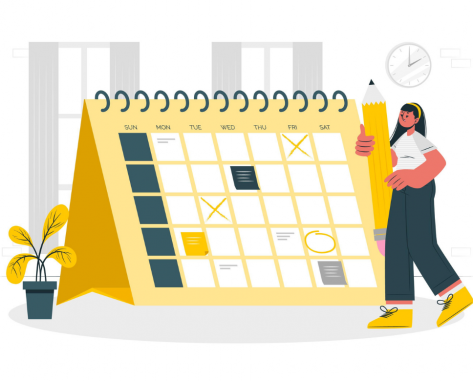LESSON OVERVIEW
In this lesson, students learn prepositions of time and get plenty of practice with this aspect of grammar. They use the prepositions in different contexts in both oral and written tasks.
This is a Flipped Classroom lesson plan. In a nutshell, it means that the first part of the lesson needs to be done by students at home. Learn more about flipped classroom and how we implement it in these lesson plans in our post.
PRE-CLASS ACTIVITIES
Prepositions of time
Before the lesson, students revise the use of prepositions of time in English. First, they have to read three short texts.Their task is to find and put time expressions from the texts under the correct headings in a table (e.g. in the evening, on Friday, at night). Then, in the next exercise, students put them into practice. They have to complete a set of fourteen sentences with correct prepositions of time. In some cases, they need to leave a gap empty (e.g. next week, this month, last year).
IN-CLASS ACTIVITIES
Practising prepositions of time
This part of the lesson starts with a discussion about calendars. Students say what events they put in them, how useful calendars are to plan a week, if they prefer digital or paper calendars, etc. Then, they complete seven sentences with correct prepositions. To make the exercise more interesting, students also check their knowledge of some events by choosing one of the two options in each of the sentences (e.g. Easter is always celebrated on Saturday/Sunday.). After that, they work in groups. Each of the students in a group gets a card with a schedule. They talk about the schedule while their partners guess what the person’s profession is. While doing the task, they use prepositions of time in each sentence they say. The next communication activity is done in pairs, but in a one-to-one class the teacher can be the student’s partner (to see more tips for using group activities in one-to-one classes, check our blog article). Each person gets a schedule and their task is to discuss it and find similarities and differences between their schedules(e.g. I’m going to have a lesson on Friday morning next week.). Still in pairs, students complete a table with time expressions which carry meaningful information for them (e.g. 2012). Then, they ask each other questions about the time expressions they mentioned (e.g. What happened in 2012?, What will happen next Wednesday?).
WORKSHEETS
Subscribe to unlock these and many other Standalone lesson lesson plans with the Unlimited plan
Subscribe











Great way to practice prepositions of time and plenty of activities. The only issue is that the jobs may be difficult for pre-intermediate students to guess (UX developer, project manager).
Thanks for your feedback! As for professions, sure, if students are not familiar with them, just skip the cards or let students name an industry (e.g. IT) or simplify the profession (e.g. ‘manager’ instead of ‘project manager’).
Great lesson! It would be great if the units included a worksheet to assign as extra practice/homework.
Thank you! I’m glad you liked the lesson 🙂
I’ve really enjoyed this lesson! However, I have a suggestion. To describe events in a schedule, students usually need a solid grasp of the Simple Present, Present Continuous, and ‘Going to’ for the future. The way I see it, the three are needed for the final speaking activities, and pre-teaching all three might be confusing, especially since (I believe) most students at A2 haven’t even had their first contact with those uses of the Present tenses (here I’m also taking into account that this is the fourth lesson in the A2 lesson flow). Maybe the lesson should narrow down the options at the end – for example, focusing only on the Simple Present for scheduled events and collocations with “have.” Including the grammar point in the lesson would also be a good idea.
Thanks for your comment! We’ll definitely consider it. However, we hope that A2 students already have a basic grasp of these tenses, which allows for broader exposure in the final activities 😊